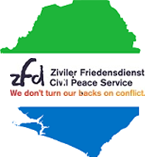
Civil Peace Service
Joined March 2020
The Civil Peace Service (CPS) is funded by the German Government. CPS experts support people on the ground in their commitment for dialogue, human rights and peace on a long-term basis.
The Civil Peace Service (CPS) is funded by the German Government. CPS experts support people on the ground in their commitment for dialogue, human rights and peace on a long-term basis. Currently, about 350 international CPS experts are active in 45 countries.
The Civil Peace Service supports projects aimed at non-violent conflict resolutions in various countries worldwide. It seconds experts to assist local partner organisations. Its objectives are the prevention of violent conflicts, the reduction of violence, and the long-term securing of peace.
CPS cooperates with local partner organisations that
- build structures of cooperation and dialogue across lines of conflict (in doing so also strengthening traditional conflict resolution),
- create meeting points and safe spaces where parties to a conflict can meet,
- strengthen information and communication structures that trace the causes and consequences of violent conflict (including the promotion of peace journalism, the networking of peace-building organisations, and monitoring the development of conflicts),
- provide assistance to groups that are particularly affected by violence and ease their re-integration into society (e.g. by providing counselling and social support for, or working with, traumatised survivors),
- provide assistance and training in methods and concepts of civil conflict resolution,
- devise courses in peace education and in dismantling enemy stereotypes,
- restore confidence in local law and order, and campaign for human rights.
A number of development and peace organisations have joined up to form the Civil Peace Service Consortium. Members of the consortium include non-governmental as well as governmental agencies. The programme is being financed by the German Federal Ministry for Economic Cooperation and Development (BMZ).
